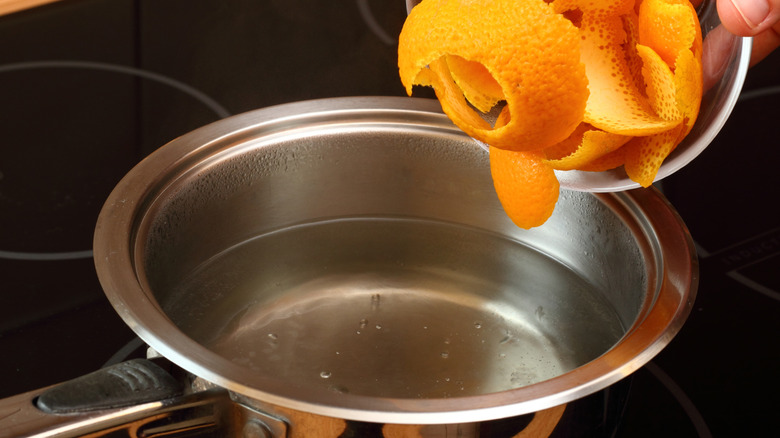The Orange Peel Hack That Could Keep Mosquitoes Away From Your Yard
No one wants bothersome mosquitoes ruining a perfectly gorgeous day on the patio, but you may be hesitant to douse everything in insecticide. Used orange peels from your kitchen might hold the key to keeping your garden safe from mosquitoes without the use of harsh chemicals.
Researchers from Nnamdi Azikiwe University found that peels from the sweet orange (Citrus x sinensis) could repel mosquitoes, cockroaches, and houseflies. Orange peels contain high concentrations of d-limonene, a naturally occurring insect-repelling chemical. Limonene has been known to kill mosquito larvae, and while it isn't deadly to adult mosquitoes, it might make them less likely to want to hang around. But it's not just mosquitoes, as orange peels can also kill ants.
The best news might be that citrus fruits containing limonene are safe to use around people and pets. You can recognize which fruits or products contain limonene by its tart yet sweet scent – which is a key part of what makes an orange smell, well, like an orange. Add orange peels to your arsenal as one of a host of other natural remedies, including planting flowers that repel mosquitoes, such as lavender (Lavandula angustifolia). These can discourage the annoying little guests from overstaying their welcome.
How to use orange peels most effectively
While you can toss orange peels or ground up orange zest directly on your flowerbeds, keep in mind orange peels are acidic, and could potentially affect your soil's pH as they degrade. Also, research is mixed about how well raw, untreated orange peels repel mosquitoes on their own, so it's a better bet to concentrate the limonene compounds in an oil or spray to enhance its repellent qualities.
To make an easy spray that might repel mosquitoes, try following a few simple steps: take your orange peels, drop them in a pan with water, cover with a lid and bring to a boil. Boil for about five minutes. Then, turn off the stove, and let the peels infuse the water overnight or up to 24 hours. You can also add in mint leaves that mosquitoes also dislike — but either way, strain out the rinds the next morning. Add the mixture to a spray bottle or a watering can, and you're ready to go.
To further discourage mosquitoes from lingering in your yard, you also might want to cut back on plants that can attract mosquitoes, such as ground covers like English ivy (Hedera helix). Mosquitoes also love flowers, just like we do, as they're attracted to beautiful blossoms like the blunt-leaf orchid (Platanthera obtusata). Don't forget to dump out all standing water in pots or the like in your yard, which makes the perfect hatching grounds for mosquitoes. If you're still overrun, you might need to contact a professional.

